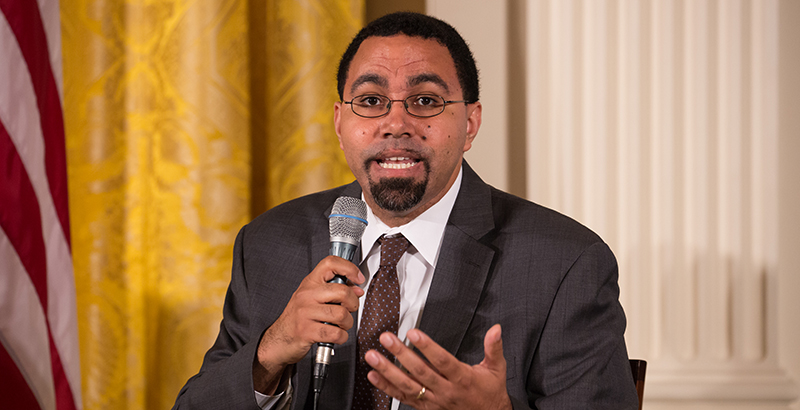The Path of Opportunity, the Path of Despair: John King offers Urban Alliance a Tale of Two High Schools

Some high schools connect students with internships where teenagers can jump-start their ambitions of becoming engineers. Other schools have auto shop classes without computers, where students prepare for jobs that existed 50 years ago. Former secretary of education and now CEO of The Education Trust John King said he has seen both examples throughout his career.
“We give the kids who need the most, so often in our society, the least,” King said during the keynote address Thursday morning at a panel hosted by the Urban Alliance and Results for America. Education leaders on the panel stressed the “urgent” need to rethink the high school experience to better prepare students for college and careers.
It’s not enough for students to show up to school and earn a high school diploma if “they aren’t leaving with the skills they need for postsecondary success and they aren’t leaving with a plan for what they’re going to do next,” King said. “That’s the challenge that we need to respond to collectively.”
Panelists agreed that there’s a disconnect between the consistently rising high school graduation rate in the U.S. and the fact that only 14 percent of low-income college students complete a college degree in eight years. Low-income students’ college completion rates have risen only 3 percentage points since 1970, as compared with their wealthier peers, whose rates have jumped 33 percentage points.
The Urban Alliance — a nonprofit that connects high schoolers with internships — released a paper Thursday highlighting how schools are failing to prepare students — particularly low-income and minority students — for college and careers. For example, 12 percent of young people ages 16 to 24 are not enrolled in school and don’t have a job, according to a 2017 report from the Social Science Research Council. This disconnect costs the economy $1 trillion, another report found, due to lost earnings and more government spending.
To address the challenge of putting students on a path to a brighter future, panelists suggested high school internships, dual-credit enrollment, and seeking the help of advisers and mentors throughout high school and college.
The Urban Alliance has found success addressing this disparity through its high school internship program, which combines paid internships with mentoring and training for low-income students during their last year of high school. The nonprofit recently completed a six-year randomized-control trial — considered the gold standard of research — and found that the young men in the program were 23 percentage points more likely to attend college than those who didn’t participate.
“We have a lot of work to do around who success is for,” said Eshauna Smith, CEO of Urban Alliance and one of the panelists. “It’s for our kids, but they don’t often know that. So when they are able to combine school with something real, [such as] being in a work environment, they are able to have a lightbulb moment.”
But it’s challenging to fit a program like this into the traditional high school model, Smith acknowledged. She recalled educators’ concerns that the Urban Alliance would take students out of class for part of the day to intern at local businesses.
These kinds of innovations require rethinking the traditional high school diploma, said panelist Jennifer Brown Lerner, assistant director for policy and partnerships at the National Commission on Social, Emotional, and Academic Development at the Aspen Institute.
“What has a high school diploma represented for the vast majority of young people?” Brown Lerner asked. “It’s represented sitting in courses for a certain period of time, demonstrating mastery at a single-point-in-time test, then earning a credit to move forward. I have yet to have a job in which that’s how I advance, and so I think we need to really think about what is a high school diploma doing.”
Panelist Lisa Dughi, chief operating officer at NAF (formerly known as the National Academy Foundation), underlined the need for partnerships between community businesses and schools. She said it’s important for companies to understand that mentoring student interns isn’t philanthropy but workforce development.
“When the businesses lean in differently, it makes it so much easier for the students, teachers, and for the school to create those partnerships…. It isn’t like they’re pulling teeth trying to get someone in the door,” Dughi said. “Those people want to be there because they see their future in the students.”
At the federal policy level, King said this kind of work has bipartisan support, evidenced by the House’s recent reauthorization of the Carl D. Perkins Career and Technical Education Act. However, he cautioned that the House didn’t go far enough to improve the act and that the Senate should add measures such as requiring rigorous research around innovation and encouraging more women and minorities to go into STEM fields.
“We can’t afford as a country to throw those kids away; that is our future,” King said.
Get stories like these delivered straight to your inbox. Sign up for The 74 Newsletter

;)
